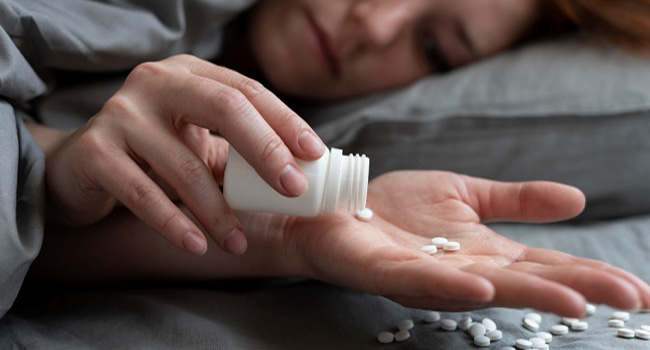
A clinical trial conducted by a team of experts sheds light on how two different medications, Buprenorphine/Naloxone and Methadone, impact the emotional well-being of people struggling with prescription opioid use disorder (POUD). The clinical trial provides valuable insights into whether these medications can also offer relief from depressive symptoms often experienced by those caught in the grip of addiction.
Prescription Opioid Use Disorder
Prescription opioid use disorder impacts both physical health and mental well-being. Alongside the physical struggles, many individuals face feelings of sadness, hopelessness, and depression.Between 47 and 60 million individuals use opioids for nonmedical reasons, with the highest rate being in North America. Among people with prescription-type opioid use disorder, depression is the most common psychiatric comorbidity, with an estimated current prevalence between 9% and 61%. Opioid use disorder is also associated with an increased risk of developing subsequent depression that persists for decades. Traditional treatments for depression are challenging to implement in POUD populations and hence, new medications are being sought to manage this condition.
Buprenorphine/Naloxone and Methadone
In this clinical trial, two medications took were compared: Buprenorphine/Naloxone and Methadone. These medications are commonly prescribed to help individuals manage their prescription opioid use disorder. They work by targeting the same brain receptors that are affected by opioids, helping to reduce cravings and withdrawal symptoms.Clinical Trial
The trial involved 272 participants suffering from prescription-type opioid use disorder. They were divided into two groups. One group was given Buprenorphine/Naloxone, while the other received Methadone. The researchers closely monitored their progress, paying special attention to changes in depressive symptoms. The depressive symptoms were measured with the Beck Depression Inventory at baseline, weeks 12 and 24.Results
The results of the clinical trial were promising and enlightening. Both medications, Buprenorphine/Naloxone and Methadone, showed a positive impact on depressive symptoms among individuals battling prescription opioid use disorder. This means that not only do these medications assist in overcoming addiction, but they also hold the potential to lift the weight of depression that often accompanies the journey to recovery.Significance
This research isn't just about medications; it's about restoring hope and enhancing the quality of life for those facing the challenges of prescription opioid use disorder. By shedding light on the positive effects of Buprenorphine/Naloxone and Methadone on depressive symptoms, the clinical trial offers a beacon of possibility for individuals who are on the path to recovery.Conclusion
The OPTIMA clinical trial brings us a step closer to understanding the intricate relationship between prescription opioid use disorder and depressive symptoms. By showcasing the positive effects of Buprenorphine/Naloxone and Methadone, the research gives hope to individuals striving to break free from the chains of addiction and reclaim their lives. As science continues to illuminate the path to recovery, it is a reminder that there is a community of support and effective treatments available for those in need.__________
Sage Journals, Dec-14-22
ClinicalTrial.gov NCT03033732
POUD Resources
DEPRESSION
Depression Resources
About Major Depressive Disorder
Managing Depression in Type 2 Diabetes with Melissa officinalis Extract
Zuranolone For Anxiety and Insomnia in Postpartum Depression
Improving Treatment for Bipolarl Depression
Creative Interventions to Alleviate Anxiety, Depression, during Protective Isolation
Boosting Physical Activity for Depression: A Hopeful Approach for In-Patient Treatment
Nasal Spray Effects on Treatment-Resistant Depression
Personalizing Treatment for Clinical Depression with Brain Stimulation
Probiotics may Improve Brain Function in Depression
Clinical Trial examines Predictors of Relapse in Psychotic Depression
Rapid Improvement of Postpartum Depression Symptoms with Brexanolone
Is Psilocybin Safe and Effective for Treatment-Resistant Depression?
Clinical Study Shows Mediterranean Diet Benefiicial for Depression
Stratified Care vs. Stepped Care: Which Approach is More Effective for Treating Depression?
Aural Rehabilitation is Effective in Treating Depression in Older Adults
Art Therapy: A Promising Intervention for COPD Patients with Depression
Can Cognitive Behavioral Therapy for Insomnia help Alleviate Depression?
Clinical Trial Proves Exercise is Effective in Treating Depression in the Elderly
Clinical Trial shows Balanced Diet can Reduce Depression
ClinicalTrial.gov NCT03033732
POUD Resources
DEPRESSION
Depression Resources
About Major Depressive Disorder
Managing Depression in Type 2 Diabetes with Melissa officinalis Extract
Zuranolone For Anxiety and Insomnia in Postpartum Depression
Improving Treatment for Bipolarl Depression
Creative Interventions to Alleviate Anxiety, Depression, during Protective Isolation
Boosting Physical Activity for Depression: A Hopeful Approach for In-Patient Treatment
Nasal Spray Effects on Treatment-Resistant Depression
Personalizing Treatment for Clinical Depression with Brain Stimulation
Probiotics may Improve Brain Function in Depression
Clinical Trial examines Predictors of Relapse in Psychotic Depression
Rapid Improvement of Postpartum Depression Symptoms with Brexanolone
Is Psilocybin Safe and Effective for Treatment-Resistant Depression?
Clinical Study Shows Mediterranean Diet Benefiicial for Depression
Stratified Care vs. Stepped Care: Which Approach is More Effective for Treating Depression?
Aural Rehabilitation is Effective in Treating Depression in Older Adults
Art Therapy: A Promising Intervention for COPD Patients with Depression
Can Cognitive Behavioral Therapy for Insomnia help Alleviate Depression?
Clinical Trial Proves Exercise is Effective in Treating Depression in the Elderly
Clinical Trial shows Balanced Diet can Reduce Depression
Are you interested in clinical trials near you?
You can receive free notification of a trial for this, or any other condition, by completing a short confidential health profile.Find a clinical trial near me
